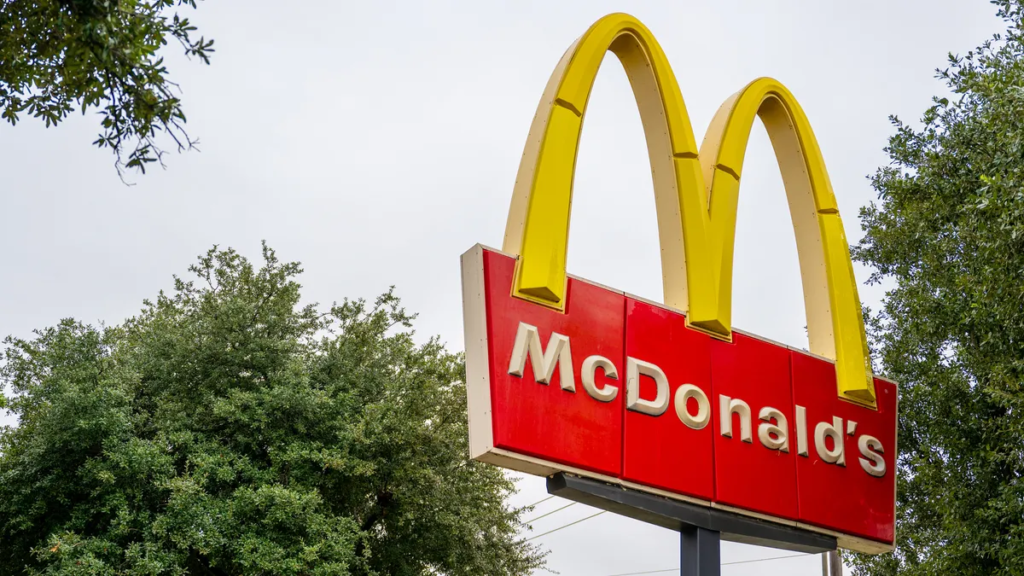McDonald shares took a significant hit in extended trading after the Centers for Disease Control and Prevention (CDC) linked an E. coli outbreak to the company’s popular Quarter Pounder burgers. This outbreak has resulted in 10 hospitalizations and one death, prompting concern among investors and customers alike.
The CDC reported that between September 27 and October 11, 49 cases of E. coli were identified across 10 states, with Colorado and Nebraska seeing the majority of cases. Most of the individuals affected had consumed a McDonald’s Quarter Pounder burger, leading the CDC to establish a connection between the food product and the outbreak. One patient developed hemolytic uremic syndrome, a serious complication that can cause kidney failure, while an older adult in Colorado tragically died from the infection.
In response to the news, McDonald’s shares dropped about 7% in premarket trading on Wednesday morning. Investors are clearly concerned about the potential fallout from this health crisis, as food safety issues can severely impact consumer trust and company performance.
McDonald Shares Fall as Company Investigates the Source of the Outbreak
Following the CDC’s announcement, McDonald’s quickly began its own investigation into the source of the E. coli outbreak. Early findings suggest that the slivered onions used in the Quarter Pounder burgers may be the culprit. These onions, which are thinly sliced fresh onions, were sourced from a single supplier that serves three distribution centers across the affected regions. As a precautionary measure, McDonald’s has instructed its local restaurants to remove slivered onions from their supply and has halted the distribution of this ingredient in areas impacted by the outbreak.
To contain the situation, McDonald’s has temporarily suspended the sale of Quarter Pounders in several Western states, including Colorado, Kansas, Utah, and Wyoming, as well as parts of other states. The company is actively working with suppliers to replenish ingredients and restore full menu offerings in these regions.
Despite the health scare, McDonald’s emphasized that the outbreak has not affected most of its menu items. In a video statement, Joe Erlinger, President of McDonald’s USA, reassured customers that other beef products, such as the cheeseburger, Big Mac, McDouble, and double cheeseburger, are not linked to the outbreak. These items use a different type of onion, which is not part of the investigation. Erlinger also reiterated McDonald’s commitment to food safety and assured customers that the company is taking swift action to address the situation.

Impact on McDonald’s Shares and Long-Term Outlook
The Quarter Pounder has long been one of McDonald’s core menu items, generating billions of dollars in revenue each year. In 2018, McDonald’s introduced fresh beef in its Quarter Pounders across most U.S. locations, a move that was well-received by customers and helped to boost sales. However, this E. coli outbreak now threatens to tarnish the brand’s reputation, at least temporarily, and has already caused a notable dip in McDonald’s shares.
The 7% drop in McDonald’s shares is a clear indication of investor concern. Foodborne illnesses can have a lasting impact on a company’s bottom line, particularly if consumer trust is eroded. McDonald’s will need to take decisive action to resolve the issue quickly and ensure that customers feel confident about the safety of its food.
The CDC has also warned that the number of people affected by the outbreak is likely higher than the reported 49 cases. Many individuals recover from E. coli infections without seeking medical care or undergoing testing, meaning that some cases may go unreported. Additionally, it can take three to four weeks for health officials to determine if a patient is part of an ongoing outbreak, further complicating the efforts to gauge the full scope of the problem.
E. coli is a group of bacteria that naturally exist in the intestines of both humans and animals. While most strains are harmless, some can cause severe illness if ingested through contaminated food or water. Symptoms of an E. coli infection, including stomach cramps, diarrhea, and vomiting, typically appear three to four days after exposure to the bacteria and usually resolve within a week. However, in more severe cases, complications such as hemolytic uremic syndrome can occur, particularly in vulnerable populations like children, the elderly, or those with weakened immune systems.
Unfortunately, this is not the first time McDonald’s has dealt with E. coli-related issues. In 2022, an outbreak linked to Chicken McNuggets Happy Meals in Ashland, Alabama, resulted in six children developing symptoms consistent with E. coli poisoning, with four of them requiring hospitalization. While McDonald’s has historically taken swift action to address such issues, the recurrence of these incidents raises questions about the company’s food safety protocols and supplier management.
Looking ahead, McDonald’s will need to focus on rebuilding trust with its customers while navigating the financial repercussions of this outbreak. The company’s proactive steps to address the situation—such as removing the potentially contaminated onions from its supply chain and halting the sale of Quarter Pounders in affected areas—may help mitigate further damage. However, with McDonald’s shares already down and the potential for additional cases to emerge, the fast-food giant will likely face continued scrutiny in the weeks to come.
In conclusion, McDonald’s shares have taken a hit due to the E. coli outbreak, and the company’s response in the coming days will be critical in restoring consumer confidence. While the majority of its menu remains unaffected, the temporary unavailability of Quarter Pounders in some states could have a lasting impact on sales. McDonald’s swift response will be crucial in minimizing the fallout and maintaining its position as a leader in the fast-food industry.
You might also be interested in – Hyundai Motor shares had a flat debut, listing at ₹1,934 on the NSE, reflecting a 1.3% discount to the IPO price